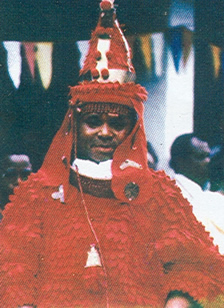| HOMEPAGE | BENIN THE HOME OF HEROES | FROM CRADLE TO BOYHOOD AND EARLY PUBLIC LIFE | THE BIRTH OF A DREAM | PRINCIPAL VENTURES |
| E-mail LOGIN |

 |
 |
THE ESAMA OF BENIN KINGDOM |
 |
The Great Life of A Pioneer |
Igbinedion as a Benin family name is now a household word. It has become synonymous with Aviation, Industry, Education, Finance, Medical Care and Rural Development at local, national and international levels. The man who has made this possible in Africa is Sir (Dr.) Chief Gabriel Osawaru Igbinedion, the Esama of Benin Kingdom. Chief Igbinedion has attained great heights in life reminiscent of great achievers. He is a philanthropist and and a humanist of national dimensions and an industrialist of international fame...read on |
IGBINEDION-THE PHILOSOPHICAL PERSPECTIVE
Chief Igbinedion's entire adult life has been characterised by actions governed by a philosophy of a peculiar circumstance. This chapter examines his philosophy as discernable from pronouncements. The desire for brevity will not permit an indepth analysis of all his addresses and speeches hence a few have been selected for the purpose of this chapter; notable philosophy on rural development in Nigeria; his philosophy on Nigeria; national unity through traditional values; his philosophy on being the brother's keeper, his philosophy on religion as a vehicle for national and international unity and his philosophy of international relations and the concept of the diaspora and world peace. For this study we have selected as case study for consideration, Chief Igbinedion's addresses and speeches at different occasions namely his lecture of Rural Development in Nigeria. The role of the private sector, at the University of Nigeria, Nsukka in 1989; his address at the occasion of the conferment on him of the chieftaincy title of Ngwang Tarok of Langtang by his Royal Highness, the Ponzhi Tarok, Plateau State in 1988; his speech at the occasion of the homecoming of late Professor Ambrose Alli, former Governor of Bendel State on his release from prison in 1988; his address on the occasion of the award of the Doctor of Philosophy (Honoris Causa) by Rust College, Mississippi, USA in 1988; his speech on the occasion of the award of the Honorary Degree of Doctor of Law at Oral Roberts University, Oklahoma, USA in 1989 and his address at the occasion of the marking of the Martin Luther King day in Nigeria 1994. The above are obviously quite few in comparison with the large number of speeches and addresses delivered by the Esama at different functions. But they do represent a spread reflective of the multi-dimensional perspectives of his philosophy, mirroring both the domestic and international aspects. For the purpose of effecting a clear understanding of the philosophical content of Chief Igbinedion's speeches, we have endeavoured to reproduce as much as possible verbatim the said speeches before attempting an interpretation. (i) IGBINEION ON THE CONCEPT OF RURAL DEVELOPMENT IN NIGERIA AND THE PRIVATE SECTOR
Chief Igbinedion's philosophy on private sector involvement in rural development was made known in a lecture he delivered as Guest Speaker at the Centre for Rural Development and Co-operatives of the University of Nigeria, Nsukka in February 1989. According to him: "The common characteristics of these areas are the lack of basic social amenities such as educational and health facilities, the absence of such services as water and electricity supplies, decent accommodation and roads. Almost invariably, the rural areas do not have industries and labour saving devices, such as agricultural machinery. What seems very obvious in our rural areas is tedious labour, unrelieved by technology, leading to low productivity with its attendant poverty that seems to be the lot of rural dwellers. The problems that arise from the lack of development in the rural areas are also manifold. The lack of modern health facilities and health education for instance, means that even common diseases become major debilitating sickness. The absence of potable water supplies means that water borne diseases spread easily. Life expectancy is invariably short and the infant mortality rate unreasonably high. The birth rate too is of course unregulated and high since this seems to be the only way to make up for the expected losses. A recent study of some rural communities, for instance, showed that the average mortality rate was not restricted to infants alone. Adults also fell victims because of acute shortages of medical facilities. These deaths normally could have been avoided. There are still some traces of ignorance in our rural areas. Apart from the predominance of adult illiteracy, educational facilities and standards tend to be very poor in the rural areas. The corridors of power are now beginning to focus on these areas. It is therefore expected that the educational system would not suffer total neglect. Both at the primary and secondary levels, education lacks adequate infrastructure, teaching facilities and well trained teachers. In most cases, the education provided seems designed to eradicate ignorance from the areas. The problems arising from lack of electricity are severe. Today, a greater proportion of the Nigerian rural population still live in darkness and are faced with the health hazard arising from the use of Kerosene. The suffering of rural dwellers are further accentuated by lack of adequate access roads for the evacuation of their goods. They have no alternative than to resort to laborious and tedious method of transportation of goods that have existed through the ages. The inadequacy of ventilated well-structured accommodation, and industries, agro-based or otherwise only add to the tedium of rural life.
It is therefore not surprising that young people find rural life boring and unattractive. They consequently migrate in large numbers to the urban centres, leaving the rural areas with greatly unbalanced population and additional problems of shortages of the right kind of manpower. The consequences of the above situation are again obvious to all of us, i.e. indiscriminate rural migration to the urban centres. Population drift from the rural areas to the metropolis in turn leads to further problems. Firstly, it promotes massive pressure on the apparently limited facilities in the urban areas creating unanticipated shortages in social services including health care delivery, light and water supply. In societies like ours where the urban centres are more or less devoid of industrial establishments and where most job opportunities are offered by the Civil Service, joblessness usually results from the excessive pressure created by the uncontrolled rush to the cities. Secondly, mass population influx encourages social squalor conducive to the growth and spread of diseases. And thirdly, it facilitates socio-economic strife and societal avarice most commonly depicted by violent robberies and other social vices. The dangers in rural-urban population drift is usually not reflected in the number that migrates but in the group of the population that is affected. Like other nations, Nigeria suffers most from the drift of the youth from the rural areas in search of the "Golden Fleece" in the cities. The drift results in two problems. Firstly it leads to the out-flow of the versatile labour force needed for the development of the rural economy to the relatively over-crowded industrial establishment in the urban centres. Secondly, it leads to imbalance in the national population spread. It is this trend which is characterised by various societal vices that rural development is expected to prevent or curtail. Okada, situated some 65 kilometres from Benin City, is part of the Ovia Local Government Area of Bendel State. Its population is about 20,000. Until recently, Okada was one of the most remote villages in Ovia Local Government Area of Bendel State. It had neither electricity, pipe borne water, modern health facilities nor adequate educational infrastructure. Indeed, nothing much but the forest. The only access road from Benin City, was the one passing through Okada to Usen, another village in the neighbourhood and it was hardly maintained. The nearest stream which is about three kilometres away served up to ten villages around Okada. Okada had only a primary school with dilapidated buildings, inadequate staffing and poor teaching aids. Like in similar situations',} the lack of basic amenities encouraged many people from Okada, particularly the youths to migrate to major towns of the Federation especially Benin City and Lagos. The end result was a considerable reduction of the population of the village youths leading to a sharp imbalance in the population ratio of the community. The uncohtrolled movement of Okada youth to the cities in turn led to other problems. Firstly, it affected adversely the farming occupation of the village community to the extent that Okada, once a food exporter to the neighbouring environment, was barely able to feed itself. Secondly, the city influences, particularly the negative ones, acquired by the migrating youth invariably shifted back into Okada, eroding the cultural values of the village community. Thirdly, recent experiences show that a good percentage of the crime mongers in most urban centres are rural youths who migrated to the cities in search of non-readily available jobs. I am not suggesting that the Okada youth in urban areas have acquired such vices. My commitment to urbanizing Okada was and is calculated to arrest this possibility." Chief Igbinedion's philosophy on rural development and the private sector economy is obviously a progressive approach and represents his dynamic stance on the problem. Rural development to him involves increase in rural economy and enhancement of the living standards of the people through the provision of social amenities. To achieve these, efforts should be based on the resources, labour and creativity of the people equipped with appropriate technology; provided by both the government, corporate bodies and the private sector including the individual as with the case of the development of Okada. Chief Igbinedion proffered solutions to the problems of rural population drift to the cities by providing amenities and jobs for the inhabitants of the Okada village. Thus he did not only curtail the drift of people from Okada to outlying cities but also improved the lot of fellow brothers and sisters. Chief Igbinedion's concept of the private sector involvement in the development of rural economy is consistent with the philosophy of great achievers.
|
(ii) IGBINEDION ON CHIEFTAINCY TITLE AND NATIONAL UNITY (iii) IGBINEDION - OUR BROTHER'S KEEPER (iv) IGBINEDION ON NIGERIA AND THE DIASPORA (v) IGBINEDION ON NIGERIA AND CHRISTIANITY (vi) IGBINEDION ON DR. MARTIN LUTHER KING JR. (vii) IGBINEDION ON LIVING TO WIN IN LIFE AND BUSINESS
|
| A great son of Africa who has become a towering international success. This is the powerful moving biography of one man's determination to win- H. R. H. Oba Lamidi Adeyemi lll, The Alaafin of Oyo |
| This remarkable biography weaves the story of an endlessly fascinating man, his family and business empire- Dr. Brian Aghedo PhD |
| Do you have what it takes to be an industrialist, businessman and philanthropist? Chief Gabriel Osawaru Igbinedion's life story tell how, withouth mortaginng your soul- Chief Pearnel Charles, Jamaica |
| Sir Igbinedion is a great man of trmemendous and unqualified resources. His humility and great service to humanity coupled with his willingness to help the less-privileged has earned him respect and admiration the world over- Prince Abubakar Audu, former executive governor of Kogi State, Nigeria. |
| Igbinedion does not believe in failure, he says, "don't be afraid, everyone has them and sometimes they can be resurrected with resounding success- Alfred Eghobamien Esq.SAN |
![]() Afew Acknowledgement of Chief Igbinedion's Sense of Philanthropy
Afew Acknowledgement of Chief Igbinedion's Sense of Philanthropy


